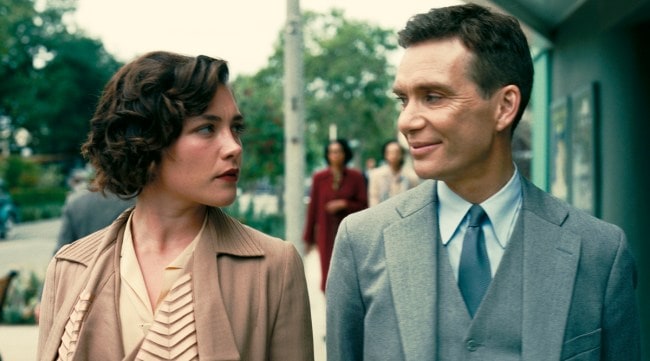Opinion With Oppenheimer, Christopher Nolan heard you — and finally went woke
This film in Nolan’s oeuvre, finally, looks back at the male saviour and asks, 'While you’re out there saving the world, who’s looking after the baby?'
 Oppenheimer is brazenly challenged by the women whom he loves, uses and abuses as per convenience. (AP)
Oppenheimer is brazenly challenged by the women whom he loves, uses and abuses as per convenience. (AP) All art aspires to the condition of music, according to 19th-century literary critic Aesthete Walter Pater. It means that every art form – prose, poetry, film, theatre, dance, visual art – aims to achieve music’s spontaneous influx of emotion, every second of a song. I find an example around the midpoint of Slaughterhouse-Five, Kurt Vonnegut’s 1969 novel about a time-travelling war veteran, when he’s watching a documentary about planes dropping bombs during World War II. The footage is played backwards in the scene, showing “bullets and shell fragments” flying back into plane hangars, a “miraculous magnetism” sucking bombs and explosive clouds into the “bellies of the plane”. The painful momentum of the sentences accelerates to a tragic crescendo before the veteran leaves his house to look for time-travelling abilities, hoping to forget all about war.
Such musical continuity hums through Christopher Nolan’s latest, Oppenheimer, a biopic of the Jewish American scientist who invented the atom bomb dropped over Hiroshima and Nagasaki, ending World War II. The film opens with a soundtrack that seems never to stop, marching from scene to scene towards an inevitable end with nary a scale change. The story starts with Cillian Murphy’s gaunt face, held weakly in place by skeletal fingers, as he’s trying to live a life in the world he’s just changed forever. That is the primary concern of the film: The nightmare of Dr Robert J Oppenheimer, a modern-day Prometheus, a man who managed to do the impossible and steal fire from the gods, forever damned for it.
Such a protagonist isn’t fallow territory for Nolan. His filmography is littered with male protagonists on seemingly impossible quests that will forever change the world. Tenet featured a CIA agent’s attempt to time-travel and prevent World War III. Interstellar featured Cooper’s travels through a wormhole to find a planet for Earthly habitation. Inception was led by Cobb’s sci-fi spy mission to convince a man he wants to dissolve his father’s multi-national business.
But Oppenheimer does display a growth in Nolan’s writing skills – for one, the women surrounding the protagonist do more than offer him motivation for a quest.
For example, in Interstellar, Murph’s primary motivation for getting into science and looking for a way to save Earth is so that she can bring back her father. In the same movie, Amelia Brand is the daughter of a famous male scientist who spearheads the space programme and is driven to the ends of the galaxy – literally – to reach the male astronaut she’s in love with. Inception featured the violent death of Cobb’s mentally ill wife, which kickstarts his quest to reunite with his children. She’s just a figment of his imagination for most of the movie. The Prestige’s magician protagonists are always mourning the death of a woman or flirting with another. Memento’s protagonist is out to avenge the death of his murdered wife. Women in Nolan’s films have always been useful for the men to grow and mature, sidelined once the ordeal is done. They serve as collateral damage for the men’s all-important goals.
Oppenheimer, on the other hand, is brazenly challenged by the women whom he loves, uses and abuses as per convenience. He is happy to move all his scientists’ families to a top-secret facility for a constant supply of moral support and free domestic labour. His wife (played by Emily Blunt) makes her displeasure clear. When he returns from work one day and questions her caretaking of their baby because of the wine bottle in her hand, she snaps that she’s been taking care of him all day, isolated from her friends and family, forced into secrecy, with barely a say in the matter. She breezily stands up to government officials who order her husband around. She doesn’t worship the myth because she’s married to it. She isn’t enamoured by the “socially inept male genius who is absolved all his sins for the greater good”, a common trope in biopics about famous 20th-century scientists like Alan Turing (The Imitation Game), Stephen Hawking (The Theory of Everything), John Nash (A Beautiful Mind) and Srinivasa Ramanujan (The Man Who Knew Infinity).
This film in Nolan’s oeuvre, finally, looks back at the male saviour and asks, “While you’re out there saving the world, who’s looking after the baby?”
That isn’t the only long-standing critique Nolan has responded to. He has always dangled a sly question mark over his films’ political underpinnings. He’s made some movies which look apolitical – like Interstellar, Prestige, Inception, Following or Memento. Then he’s made some which are subtly conservative – like the Dark Knight trilogy (about a vigilante who violently interrogates and apprehends criminals, uses mass surveillance tactics, and takes down anarchists frustrated with systemic corruption and inequality) and Dunkirk (about the rescue of Allied soldiers from a deadlocked beach, topped off with a jingoistic finale of Winston Churchill applauding the war effort).
But with a powder-keg of a subject like the atom bomb, Nolan dives headlong into the headlines of the era and how Oppenheimer featured in them. He’s a scientist, but an intellectually voracious one, so devours texts like Das Kapital and Bhagavad Gita to know what their ideological and spiritual fuss is about. He takes shots at everyone – military generals, college-going communists, power-hungry politicians. He is amused and confused by the knee-jerk fear that words like “socialism” evoke in American living rooms. He is annoyed by White America’s cultural arrogance – when asked what should be done with the bomb testing site in New Mexico after the test is successful, he says, “Give it back to the Indians,” referring to Spanish invasion of the Native Americans in the 16th century. Oppenheimer keeps trying to be just a scientist but is forced to grow into a politician. The film he’s in cares deeply about clashing ideologies, and Oppenheimer couldn’t care less.
In fact, the film doesn’t even see science and rationality as the ultimate solution to all of mankind’s problems, a naïve sentiment Oppenheimer starts out his story with. “Genius is no guarantee of wisdom,” his mentor says, harkening to a dominant 20th-century art movement – postmodernism – that alleges science is just another story, just another human activity like religion or mythology, upheld by numbers and equations instead of belief and community, incapable of solving all human problems across space and time. To think that ethical science will solve that fundamental human folly – irrationality – is naïve. To think that the world is split into oppressors and saviours, wokeism and fascism, heroes and villains, is a mistake. Oppenheimer is forced to swallow this bitter pill. He’s not a martyr, not a prophet, not a Jesus – or he’s all of that, along with being a small-town boy who struck big and got a shot at eternal glory.
Watch this movie like you would listen to a piece of music. It’s talkative and dialogue-heavy, so if it gets too much, follow the rhythm of the scenes, and don’t get bogged down in the words – the music will swell and ebb and flow and swirl with the intensity of the scenes. Let it carry you. Above all, remember the suggestion Vonnegut’s war veteran receives when he despairs about his inability to forget war victims: “Pity the men who had to do it.” You will find silence and nothing to applaud.
udbhav.seth@expressindia.com






